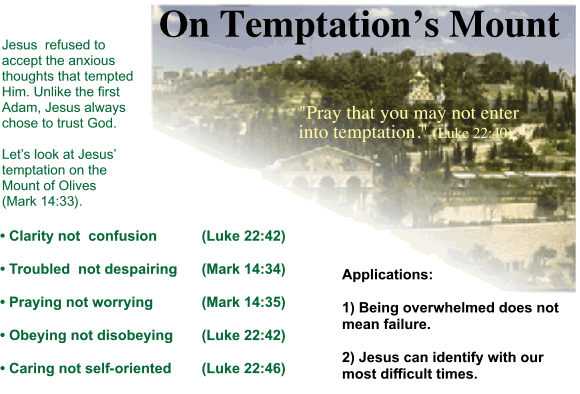Jesus is our model for living. We are to be like Christ. In Philippians 2 we read that Christ released His right to utilize His divine powers so that He could become a man. The point here is that Jesus drew on the same resources that we have today as God's children. As God's children, we can have Christ's Spirit live through our frail lives.
 Fixing our eyes on Jesus, the author and perfecter of faith, who for the joy set before Him endured the cross, despising the shame, and has sat down at the right hand of the throne of God. (Hebrews 12:2, NASB). Fixing our eyes on Jesus, the author and perfecter of faith, who for the joy set before Him endured the cross, despising the shame, and has sat down at the right hand of the throne of God. (Hebrews 12:2, NASB).
Many anxious thoughts crossed Jesus' mind at different points in His ministry. Mark 14:33-34 records,
And He took with Him Peter and James and John, and began to be very distressed and troubled. And He said to them, "My soul is deeply grieved to the point of death; remain here and keep watch."
Clearly we see him beginning to be distressed and troubled. we see Himself stating that "My soul is deeply grieved." There is no doubt that Jesus walked down the path as the "Man of Sorrows" here.
He was despised and forsaken of men, A man of sorrows, and acquainted with grief; .... (Isaiah 53:3).
One might think Jesus worried when He sweat drops like blood. But He didn't. Emotional turmoil engulfed His soul. He was deeply grieved and distressed. But He chose to trust God rather than go by what He felt as best. Worry chooses to serve its own fears.
Jesus didn't flinch in choosing what was best. He sweated over the unpleasant task, but in the end He said, "Let your will be done." Unlike the first Adam who went along with the temptation, Jesus instead chose to trust God. Each Gospel closes by recording how He endured the phony trials, the mockings, beatings and finally endured the cross. If He was worrying, He would have taken another 'easier' path
Let's look at five confirmations that He did not worry during this dark, dark hour.
1• Clarity not confusion
(Luke 22:42)
|
The mark of worry is confusion. Jesus was very clear about what was happening and what steps He needed to take. |
"Father, if Thou art willing, remove this cup from Me." (Luke 22:42) |
2• Troubled not despairing
(Mark 14:34)
|
We must not deny the fact that Jesus experienced great emotional upheaval. He was troubled. Worry, however, is when we allow the troubles to cause us to give up. |
And He took with Him Peter and James and John, and began to be very distressed and troubled. And He said to them, "My soul is deeply grieved to the point of death; remain here and keep watch." (Mark 14:33-34) |
3• Praying not worrying
(Mark 14:35)
|
When we worry, we cannot pray. When we pray, we do not worry. Jesus knew He needed this special time of prayer and did just that. Even if His disciples fell asleep, He would pray. |
And He went a little beyond them, and fell to the ground, and began to pray that if it were possible, the hour might pass Him by. (Mark 14:35)
|
4• Obeying not disobeying
(Luke 22:42)
|
One test to see if Jesus worried, or took things into His own care, is to see if He disobeyed God. Instead we find Him fully committing Himself to God's will. "Not my will, but Thine be done." Obedience confirms the absence of worry. |
"Father, if Thou art willing, remove this cup from Me; yet not My will, but Thine be done."
43 Now an angel from heaven appeared to Him, strengthening Him.
44 And being in agony He was praying very fervently; and His sweat became like drops of blood, falling down upon the ground. (Luke 22:42-44)
|
5• Caring not self-oriented
(Luke 22:46)
|
When people worry, they become selfish. They attend to their own needs without thinking rightly of others. Jesus here kept encouraging the disciples to stand with Him in prayer. He patiently loved them despite their failure. |
And said to them, "Why are you sleeping? Rise and pray that you may not enter into temptation."
(Luke 22:46,).
|
"Pray that you may not enter into temptation." (Luke 22:40).
Applications
1) Sometimes we can be overwhelmed in our soul, but this does not mean we have failed to trust God. Often the tempter wants to convince us that the temptation and the sin is the same. By so convincing us, he then suggests we already sinned. It is too late.
Instead, we are to be like Jesus. Understand what the difficult circumstances require but then rely on God the Father for strength and provision. The way we respond during temptation makes every bit of difference. Jesus took the path of His Father's will. We don't have to worry. We can pray aloud and choose to trust God.
2) Jesus really can identify with the times we face severe anxious thoughts. He can work with us and deliver us. During such times our: 1) emotions, 2) limited choices, and 3) anxious thoughts will be placed before our minds seemingly as the only alternative. Instead, seek what your Father in heaven desires, pray, cast your self on Him, and obey.
Summary
Those who worry a lot tend to believe anxious thoughts and anxiety are the same thing. If we see them as the same thing, then we have no way of eliminating them. We believe they are part of our lives. We need to first discern them, then reject them and lastly to accept God's way as our own.
Let's review some of the major principles and applications. Next page

|



